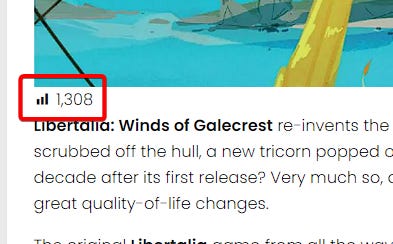Do we live in a world where the written word has been superseded by video? Or does it just seem that way, because it’s much easier to tell who is watching than who is reading?
Let me ask you a question. Where do you go for board game reviews?
Chances are you’ve answered with the name of someone on YouTube. Maybe your decisions are influenced by Tom Vasel and the rest of the Dice Tower crew. Maybe you like Luke’s dulcet tones over at The Broken Meeple, or the madcap videos of Shut Up & Sit Down. How many of you named someone like Charlie Theel or Dan Thurot though? Writers of reviews instead of creators of videos.
I write reviews of board games over at Punchboard. I really enjoy writing reviews. Despite being pretty self-sufficient, I like the validation I get when someone tells me they like what I’ve written. I like it when a game's publisher sends me a copy of their game so that I can talk about it.
I’m not naive though. I don’t think anyone is sending me a game because they hang on my every word. I don’t think my opinion of a game has the designer and publisher on the edge of their seat, waiting to read what I think. Publishing board games is a business, and in order to be a successful publisher, they need to sell a lot of games. Reviews are a way to get eyes on a publisher’s games, to get people talking about them, and hopefully spending their money on them.
A little context
I often think about the things I’m talking about here, but what prompted me to write this was a blog post by Jamey Stegmaier, of Stonemaier Games. It’s tantalisingly titled “Is there a future for written reviews”, which obviously piqued my interest. What, with me writing reviews and all.
I suggest you go and read that post, because it’s always enlightening to hear things from a publisher’s point of view, and Jamey is nothing if not transparent. One of the points he touches on in the piece is that YouTube is a great platform for creators competing to be seen, because a channel’s subscribers, likes, views and comments are front-and-center. It’s a ubiquitous platform. If you publish your videos there, you already know that the whole world can see how many people are watching your creations.
Is the number of views king when it comes to a publisher choosing who to send games to? Maybe it’s the channel subscribers? Maybe it’s both? I’m willing to bet that in a lot of cases, for a lot of publishers, it’s a combination of these numbers and a channel’s social media followers, and not much else. It’s marketing, right? The more eyes on your game, the better. I’ve filled so many media interest forms and had to sigh when I get asked “How many subscribers does your channel have?” or “How many views per month do you get?”.
What does that mean for writers like me? How do I demonstrate to a publisher that there’s value to them in my receiving a copy of their game? For many blogging platforms, an article’s view count isn’t published. But even if it was, how many of you out there would ever even think to look at it, or pay attention to it?
Show off
If you want someone to know how many people are reading your writing, and where they’re finding you, you need to tell them. There are a lot of ways to go about it, here are some of my preferred ways.
Install a view counter - most blogging platforms give you some way to show how many times your posts have been read. I’ve got one called ‘Post View Counter’ in my wordpress.org platform, which adds a nice little counter at the top of my posts:
Know how you are being found - If you’ve got your own domain, there’s a good chance you could - and should - be using Google Search Console. It’s a fantastic tool for analysing how many hits your site is getting, where they’re coming from, and what people are searching for when they find you.
It even gives you your average Google search position for particular phrases, which is a great thing to be able to demonstrate. Publishers - do you ever think to search for reviews of your games and see who’s on the first few pages?SEO plugins - Wordpress users have a lot of options when it comes to getting their SEO right. I use one of the most popular plugins - Yoast - which is really handy when it comes to making sure you’re doing everything you can to help Google and Bing find you. Good alt text for images, keyword distribution, Google search preview - there’s plenty you can be doing.
Selling yourself when you talk to a publisher doesn’t need to be a case of “I am the best in the world”. They’re not idiots, and they can smell your bullsh!t a mile off. Be honest, and play to your strengths. If you rank in the top 5 in Google Search Console for one of their games, show that. If you’ve had a thousand reads for a review in the last two days, show it.
Does it even matter?
This whole post all hinges on one fundamental question - do you care?
If you write because you like to write, you don’t care who sees it, and you don’t give a damn what publishers think. Then all of this is irrelevant. Do what you do, because you like doing it. I had a lot of respect for anyone doing this.
If, like me, you write because you love it but you also want to feel relevant among your peers - that’s okay. It doesn’t make you a shill, it doesn’t make you a sellout. It doesn’t mean you’ve forgotten why you started in the first place. First and foremost, write to share your love of your hobby. If that takes you to talking to publishers and designers, try to remember a couple of very important things.
Firstly, they are running a business. You aren’t. As friendly as you may or may not be with the media contact at a publisher, what they want is for potential customers to see their games. If a publisher chooses not to work with you, don’t take it personally. It’s a business decision, not necessarily a personal one.
Secondly, if you want those publishers to see you as a good investment in terms of why they should send you a copy of their game, tell them why. Tell them how many visitors a day you get. Show them how good your SEO is when it comes to their games. Send them links to your work, especially if it represents one of their games.
In a world obsessed with video, remind people why the written word matters.







